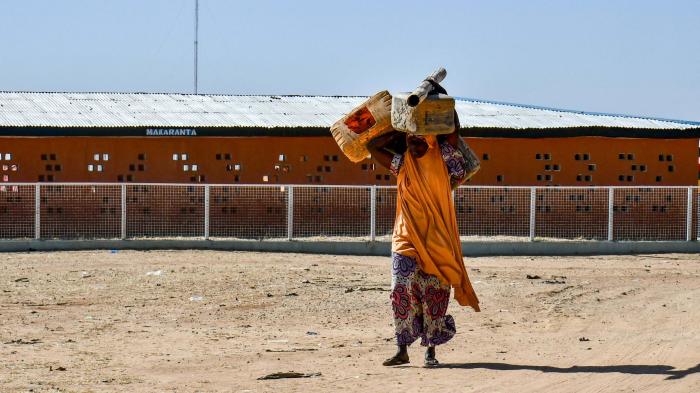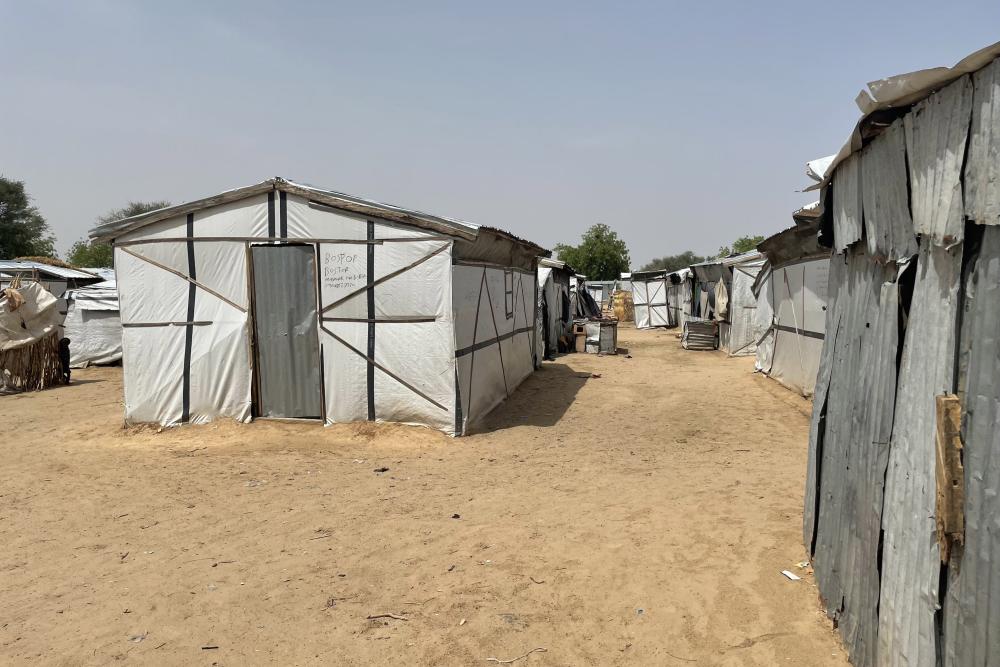 A tent constructed for shelter by an INGO in Dalori I camp in Maiduguri, which is set to be shut down by the Borno State government. IDP camp shutdowns by the government have sustainable alternatives to ensure they can meet basic needs including food and adequate shelter.
© 2021 Anietie Ewang/Human Rights Watch
A tent constructed for shelter by an INGO in Dalori I camp in Maiduguri, which is set to be shut down by the Borno State government. IDP camp shutdowns by the government have sustainable alternatives to ensure they can meet basic needs including food and adequate shelter.
© 2021 Anietie Ewang/Human Rights Watch
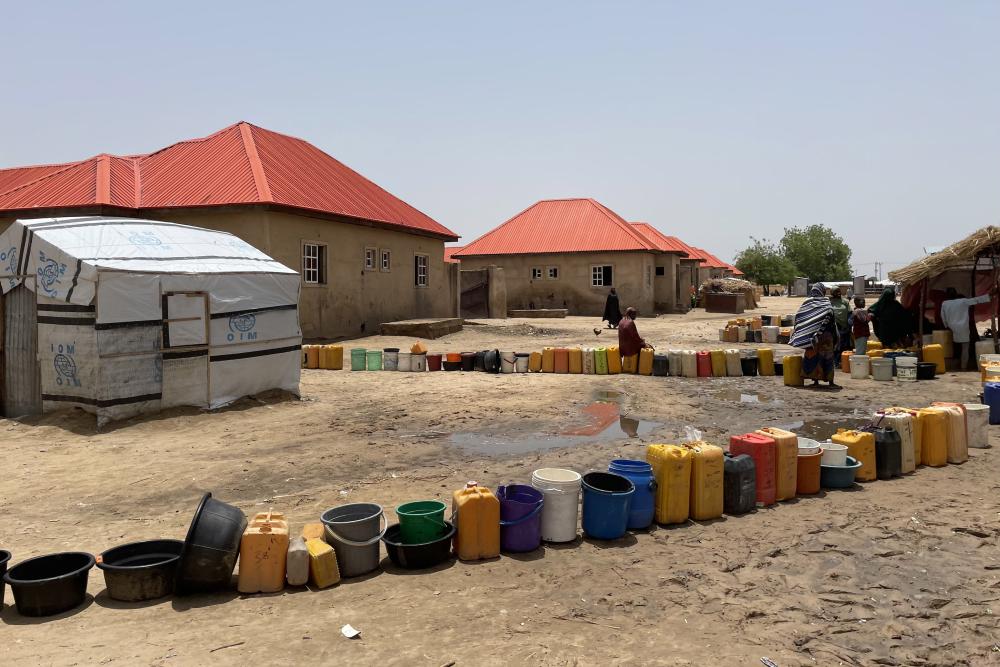 Gallons, basins and buckets lined up by people in front of a tap to fetch water in Gubio IDP camp, which is set to be shut down by the Borno State government. Displaced people in Gubio Camp live either in tents constructed by international nongovernmental organizations (INGOs) or in buildings already existing on the premises before it was designated as a campsite.
© 2021 Anietie Ewang/Human Rights Watch
Gallons, basins and buckets lined up by people in front of a tap to fetch water in Gubio IDP camp, which is set to be shut down by the Borno State government. Displaced people in Gubio Camp live either in tents constructed by international nongovernmental organizations (INGOs) or in buildings already existing on the premises before it was designated as a campsite.
© 2021 Anietie Ewang/Human Rights Watch
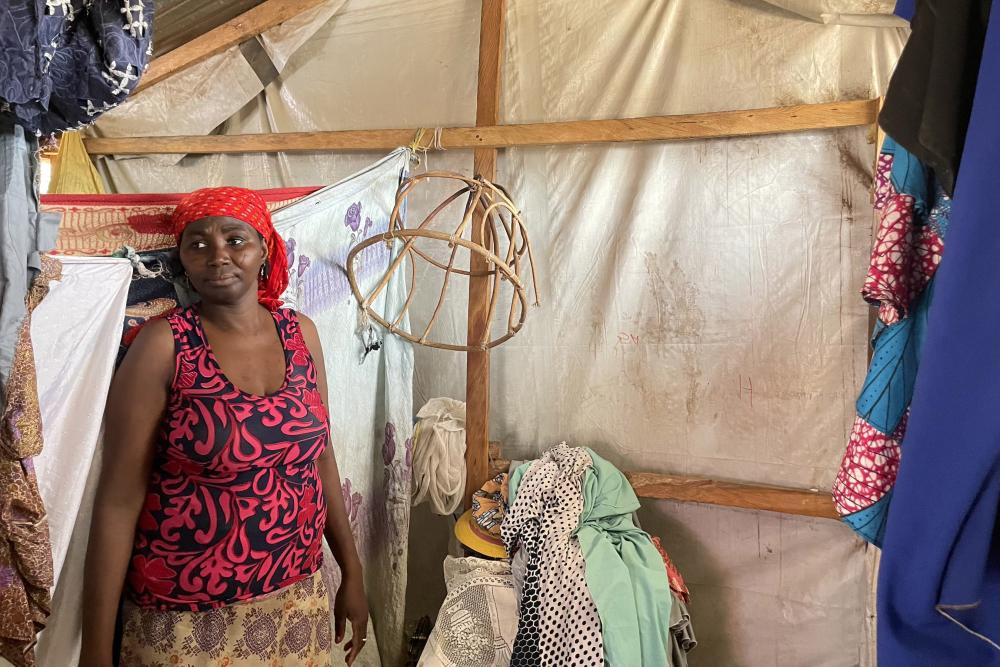 A displaced woman inside her tent constructed by an INGO in Gubio IDP camp in Maiduguri, which is set to be shut down by the Borno State government. IDP camp shutdowns have compelled displaced people to leave the camps without consultation, adequate information, or sustainable alternatives to ensure they can meet basic needs including food and adequate shelter.
© 2021 Anietie Ewang/Human Rights Watch
A displaced woman inside her tent constructed by an INGO in Gubio IDP camp in Maiduguri, which is set to be shut down by the Borno State government. IDP camp shutdowns have compelled displaced people to leave the camps without consultation, adequate information, or sustainable alternatives to ensure they can meet basic needs including food and adequate shelter.
© 2021 Anietie Ewang/Human Rights Watch
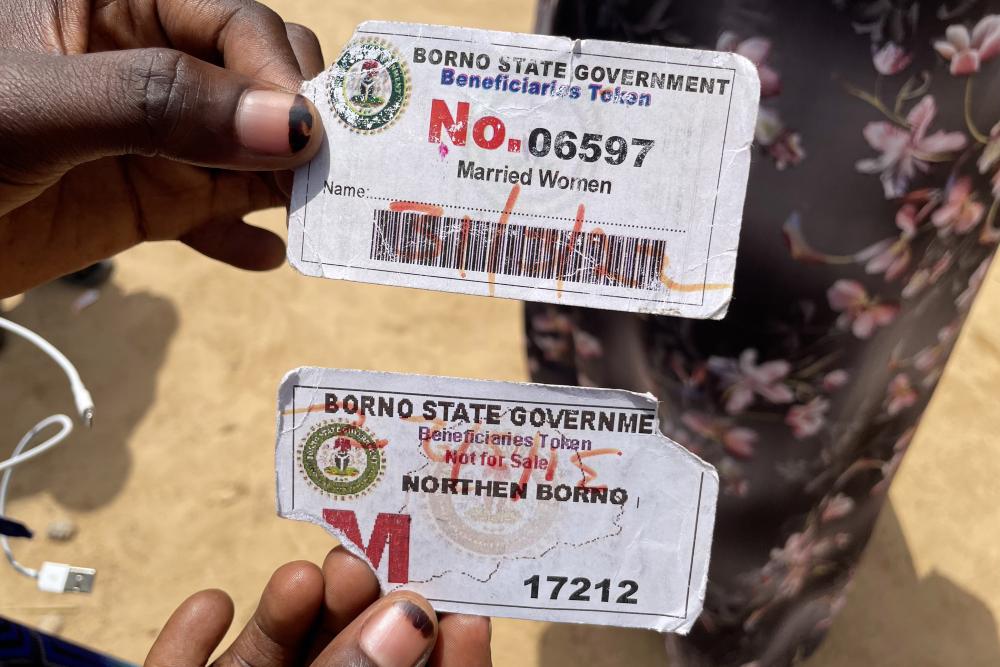 Cards distributed to enumerated male and female heads of households and wives in male-headed households that identified them to receive money (between 50,000 and 100,000 naira, or US$116 to and US$232) for livelihood support prior to the Bakassi camp shutdowns in November 2021. Funds distributed were too little to provide any meaningful support for displaced families forced to move out of the camp and build their lives afresh, and were instead often spent on immediate needs.
© 2021 Anietie Ewang/Human Rights Watch
Cards distributed to enumerated male and female heads of households and wives in male-headed households that identified them to receive money (between 50,000 and 100,000 naira, or US$116 to and US$232) for livelihood support prior to the Bakassi camp shutdowns in November 2021. Funds distributed were too little to provide any meaningful support for displaced families forced to move out of the camp and build their lives afresh, and were instead often spent on immediate needs.
© 2021 Anietie Ewang/Human Rights Watch
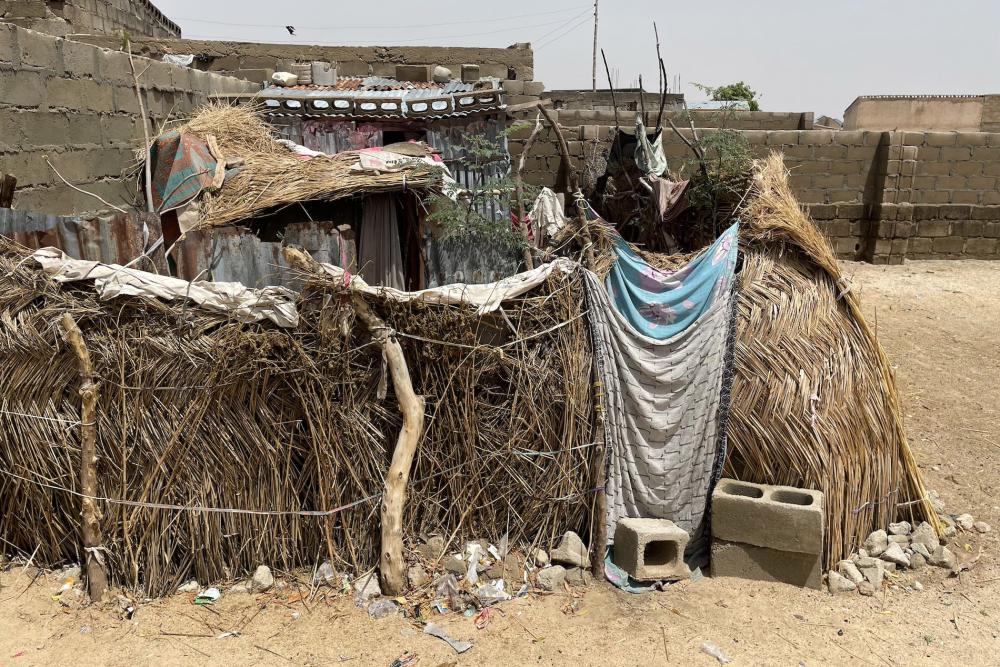 Tent built for shelter in Musari, a low-income community in Maiduguri, by a family forced to move from Bakassi camp, which the Borno State government shut down in November 2021.
© 2021 Anietie Ewang/Human Rights Watch
Tent built for shelter in Musari, a low-income community in Maiduguri, by a family forced to move from Bakassi camp, which the Borno State government shut down in November 2021.
© 2021 Anietie Ewang/Human Rights Watch
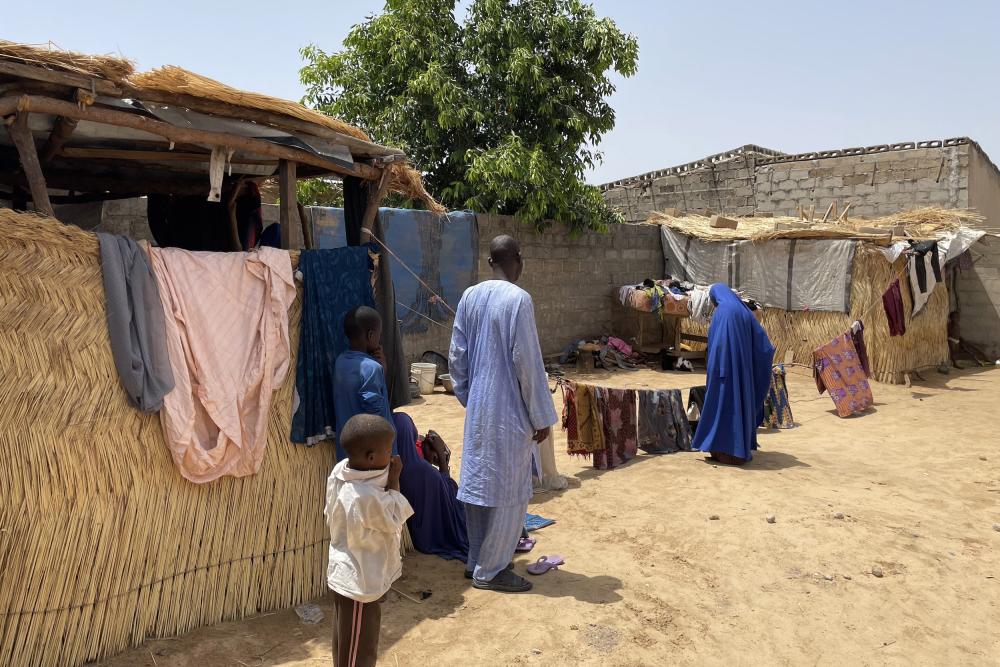 A displaced family outside their home, a thatch tent, in Musari, a low-income community in Maiduguri. Their belongings include a mattress and clothes left outside to dry following heavy rainfall that destroyed the roof and penetrated the tent.
The family obtained permission to build the tent on privately owned land after they were forced out of Bakassi camp, which the government shut down in November 2021.
© 2021 Anietie Ewang/Human Rights Watch
A displaced family outside their home, a thatch tent, in Musari, a low-income community in Maiduguri. Their belongings include a mattress and clothes left outside to dry following heavy rainfall that destroyed the roof and penetrated the tent.
The family obtained permission to build the tent on privately owned land after they were forced out of Bakassi camp, which the government shut down in November 2021.
© 2021 Anietie Ewang/Human Rights Watch
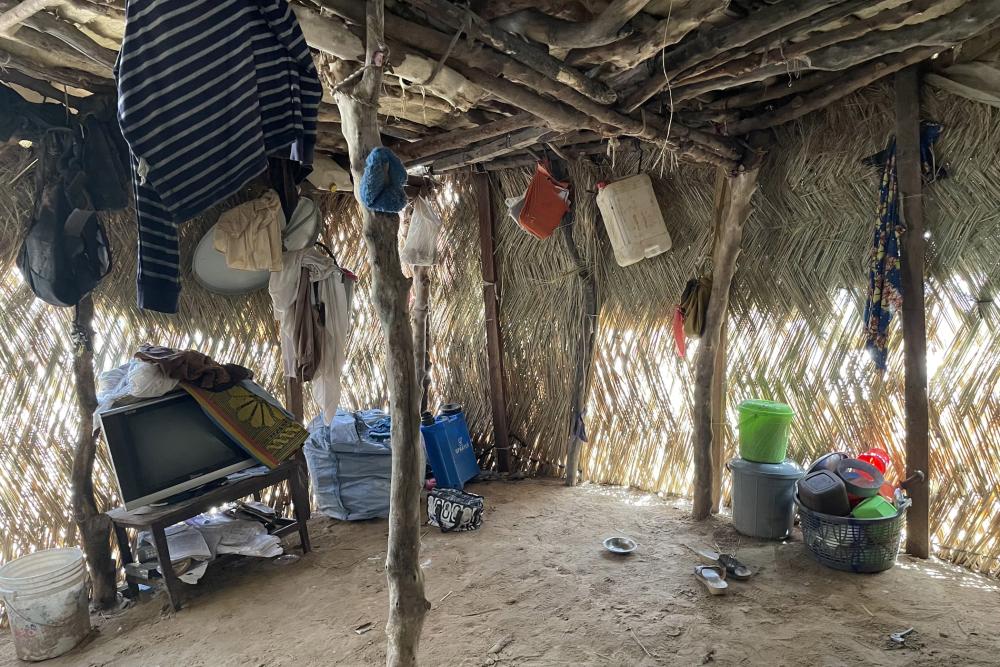 Inside a thatch tent, home to a displaced family of nine forced to move from Bakassi camp, which the Borno State government shut down in November 2021. The family sought permission from a private land owner in Musari, a low-income community in Maiduguri to build the tent, which has been inadequate to protect them and their belongings from heavy rains.
© 2021 Anietie Ewang/Human Rights Watch
Inside a thatch tent, home to a displaced family of nine forced to move from Bakassi camp, which the Borno State government shut down in November 2021. The family sought permission from a private land owner in Musari, a low-income community in Maiduguri to build the tent, which has been inadequate to protect them and their belongings from heavy rains.
© 2021 Anietie Ewang/Human Rights Watch
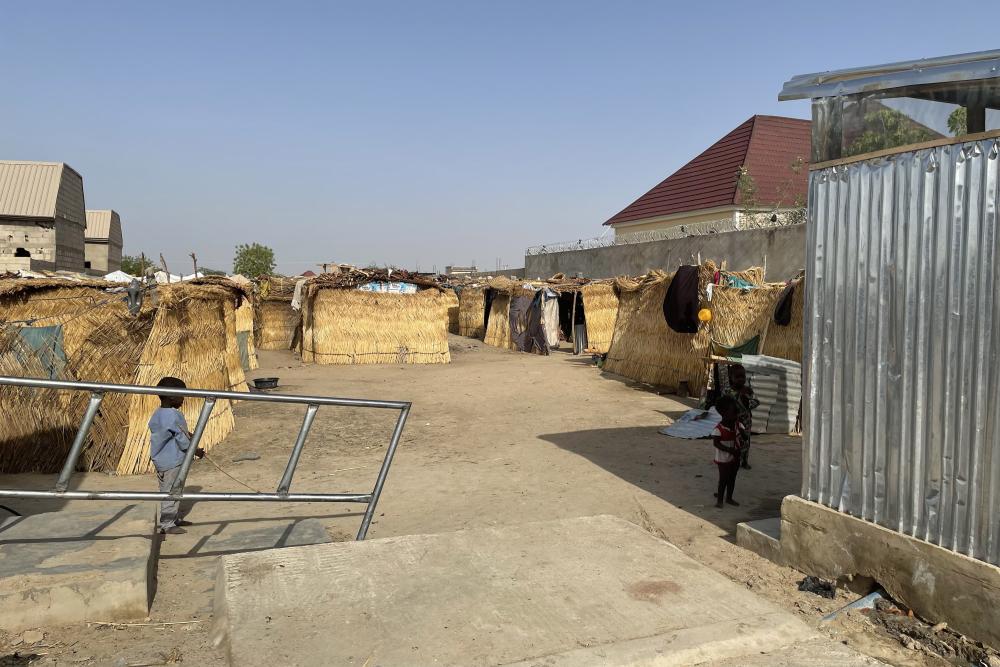 An informal camp in Sulumburi, Maiduguri, where some displaced families have sought shelter following the shutdown of IDP camps in Maiduguri. Informal camps exist where private landowners give permission to displaced people to build structures consisting mostly of thatch or tarpaulin for temporary shelter. People live independently in these camps, which are not organized or supported by the government. Humanitarian agencies, however, sometimes provide one-off support to some informal camps by constructing latrines or donating thatch and tarpaulin to enable displaced persons to build shelters.
© 2021 Anietie Ewang/Human Rights Watch
An informal camp in Sulumburi, Maiduguri, where some displaced families have sought shelter following the shutdown of IDP camps in Maiduguri. Informal camps exist where private landowners give permission to displaced people to build structures consisting mostly of thatch or tarpaulin for temporary shelter. People live independently in these camps, which are not organized or supported by the government. Humanitarian agencies, however, sometimes provide one-off support to some informal camps by constructing latrines or donating thatch and tarpaulin to enable displaced persons to build shelters.
© 2021 Anietie Ewang/Human Rights Watch
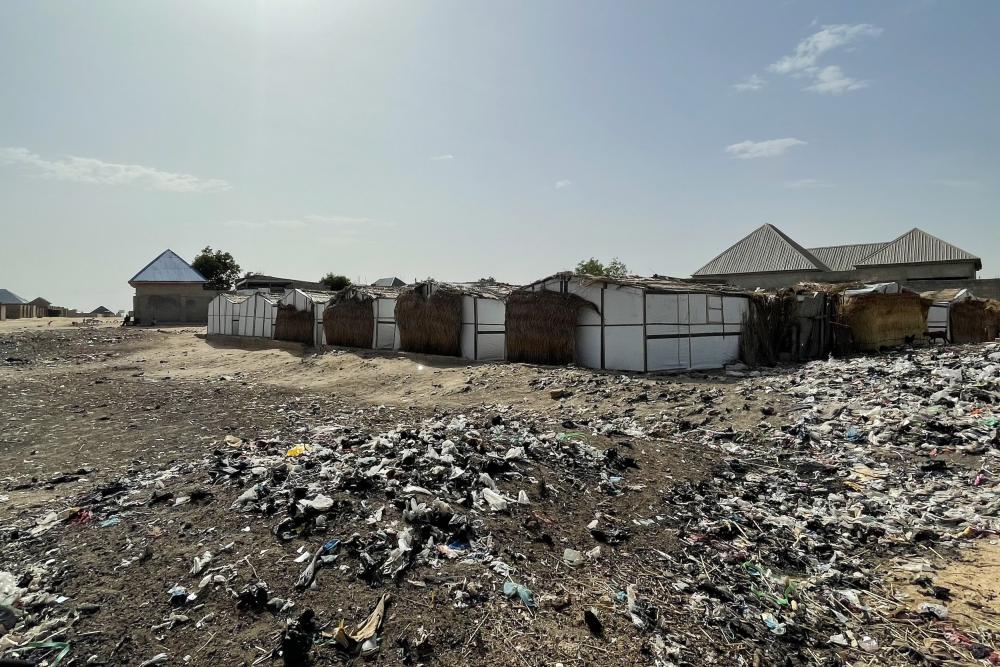 An informal camp in Sulumburi, Maiduguri, where some displaced families have sought shelter following the shutdown of IDP camps in Maiduguri. Informal camps exist where private landowners give permission to displaced people to build structures consisting mostly of thatch or tarpaulin for temporary shelter. People live independently in these camps, which are not organized or supported by the government. Humanitarian agencies, however, sometimes provide one-off support to some informal camps by constructing latrines or donating thatch and tarpaulin to enable displaced persons to build shelters.
© 2021 Anietie Ewang/Human Rights Watch
An informal camp in Sulumburi, Maiduguri, where some displaced families have sought shelter following the shutdown of IDP camps in Maiduguri. Informal camps exist where private landowners give permission to displaced people to build structures consisting mostly of thatch or tarpaulin for temporary shelter. People live independently in these camps, which are not organized or supported by the government. Humanitarian agencies, however, sometimes provide one-off support to some informal camps by constructing latrines or donating thatch and tarpaulin to enable displaced persons to build shelters.
© 2021 Anietie Ewang/Human Rights Watch
Africa
